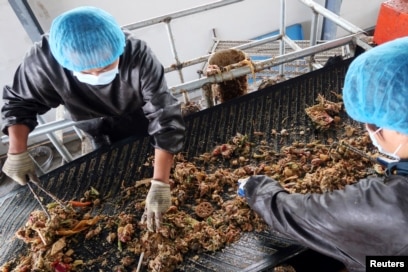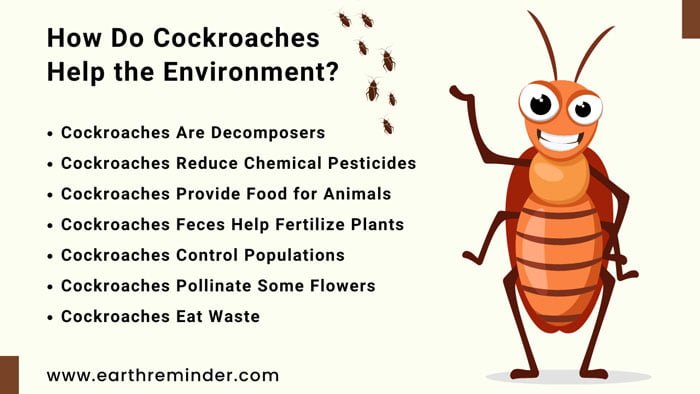Cockroaches play a vital role in the ecosystem by aiding in the decomposition process and releasing nitrogen into the soil. Their feeding habits contribute to the breakdown of decaying organic matter, providing essential nutrients for plants.
Additionally, cockroaches are a source of food for various animals and are high in protein. They also possess highly efficient body structures, which are studied for potential technological and medical applications. While they might not be welcome in homes due to disease-transmission risks, the benefits of cockroaches in nature and scientific research cannot be overlooked.
Ecological Value
Cockroaches may not be the most pleasant creatures to have around, but they play a crucial role in the ecosystem, providing various benefits that contribute to the balance of nature.
Role Of Cockroaches In The Ecosystem
- Cockroaches are essential for nutrient recycling in the ecosystem.
- They consume decaying organic matter, releasing nitrogen into the soil.
- This nitrogen becomes easily-absorbed nutrients for plants, promoting their growth.
Contribution To Nutrient Recycling
- Cockroaches help in breaking down dead plants, animal waste, and garbage.
- They convert these materials into valuable nutrients for the soil.
- These nutrients support plant growth and maintain the overall health of the ecosystem.

Credit: learningenglish.voanews.com
Nutritional Benefits
High Protein Content
Cockroaches are known for their high protein content, making them a valuable nutritional source. In fact, they are considered to be one of the most protein-rich insects. Their protein content makes them a potential food source in many cultures around the world.
Potential As A Food Source
Due to their high protein content, cockroaches have the potential to serve as a sustainable food source. In some regions, they are consumed as a rich protein supplement and are even used in traditional medicine for their nutritional value.
Medical And Pharmaceutical Applications
Cockroaches have the advantage of being helpful in medical and pharmaceutical applications. They can be used as a source of protein for humans and animals, and their feces contain nitrogen that benefits plant growth. Additionally, scientists study the efficiency of cockroach legs for developing prosthetic and robot applications.
Use In Medicine
In addition to their adaptability and survival skills, cockroaches have a surprising advantage when it comes to medical and pharmaceutical applications. These resilient creatures have been used in various medical research studies and are found to possess unique properties that can benefit human health.One such application is in wound healing. Cockroach extract has been found to have antimicrobial properties, which can help prevent infections in wounds. The extract contains certain bioactive compounds that have proven to be effective against common bacteria strains, including staphylococcus and streptococcus.Cockroach Farming
Another interesting aspect of cockroaches is their potential as a valuable resource through cockroach farming. These creatures can be raised and bred under controlled conditions, primarily for their use as a food source for humans and non-human animals. Cockroaches are high in protein and can be a sustainable source of nutrition, especially in regions where traditional livestock farming is not feasible.Cockroach farming also has pharmaceutical applications. Cockroach farming plays a crucial role in supplying the pharmaceutical industry with these insects for various medical research purposes. The cockroaches are typically processed and sterilized before being used in medicine.Prosthetic And Technological Advancements
Cockroaches have the advantage of contributing to the environment by consuming decaying organic matter, releasing nitrogen into the soil as easily-absorbed nutrients. They play a crucial role in recycling and maintaining ecosystems.
Efficiency Of Cockroach Legs
The cockroach leg is a marvel of efficiency, inspiring advancements in technology and prosthetics.
Biomedical Engineering Insights
Scientists delve into the remarkable features of cockroach legs to enhance biomedical engineering applications.
The incredible adaptability of cockroach legs offers valuable insights for improving prosthetic limbs and robotic technologies.
Researchers analyze the intricate structure of cockroach legs to optimize movement and agility in artificial limbs.
Cultural Perspectives
Cockroaches can be advantageous as they contribute to the environment by consuming decaying matter, releasing nitrogen in their feces, which enriches the soil for plants. Their role in recycling and serving as a food source for other creatures highlights their importance in the ecosystem.
Chinese Initiatives: Exploring Cockroach Benefits
In Chinese culture, cockroaches are valued for their medicinal properties. Over the centuries, they have been utilized in traditional Chinese medicine for various ailments. Current initiatives in China are further exploring the potential health benefits of cockroaches, including their use in treating conditions such as gastrointestinal disorders and skin infections.
Global Views On Cockroaches
Globally, cockroaches hold a significant place in the ecological system. They contribute to ecosystem balance by aiding in the decomposition of organic matter. Their feeding habits play a crucial role in nutrient recycling by releasing vital components into the soil, benefiting plant growth and soil fertility.

Credit: blog.therainforestsite.greatergood.com
Controversies And Misconceptions
Controversies and Misconceptions:
Debunking Myths About Cockroaches
Cockroaches are often associated with filth and disease, but many of these beliefs are based on myths rather than facts.
Balancing Benefits And Drawbacks
While cockroaches can have advantages in ecosystems, they also come with their own set of drawbacks that need to be considered.
- Cockroaches contribute to the environment by eating decaying organic matter, releasing nitrogen that benefits plants.
- Despite their benefits, cockroaches can also spread diseases and act as reservoirs for harmful bacteria.
Not all misconceptions about cockroaches hold true, and it’s important to weigh both the benefits and drawbacks when considering their role in nature.

Credit: blog.therainforestsite.greatergood.com
Frequently Asked Questions
Are There Any Benefits To Roaches?
Cockroaches benefit the environment by eating decaying matter and releasing nitrogen for plants to use.
What Are The Disadvantages Of Cockroaches?
Cockroaches can spread diseases like salmonella and harbor harmful bacteria and viruses, posing health risks.
Are Cockroaches Used For Anything?
Cockroaches have benefits as they contribute to the environment by eating decaying organic matter and releasing nitrogen into the soil for plant use. They can also be raised as a food source for humans or sold to the pharmaceutical industry.
Conclusion
While cockroaches may have a negative reputation, they play an important role in the ecosystem. Their ability to break down organic matter and release nutrients into the soil benefits plants and other organisms. Furthermore, research on their unique anatomy contributes to advancements in prosthetics and robotics.
Despite their nuisance in homes, cockroaches have valuable ecological contributions.
Related posts:

I’m MD Tanvir, and I bring years of expertise gained from working closely with pest control companies to the forefront. My journey in the industry has inspired me to launch Bug Battler, a platform aimed at equipping people with the know-how to combat pests autonomously. Through Bug Battler, I aim to empower individuals with practical insights to tackle pest infestations effectively.

